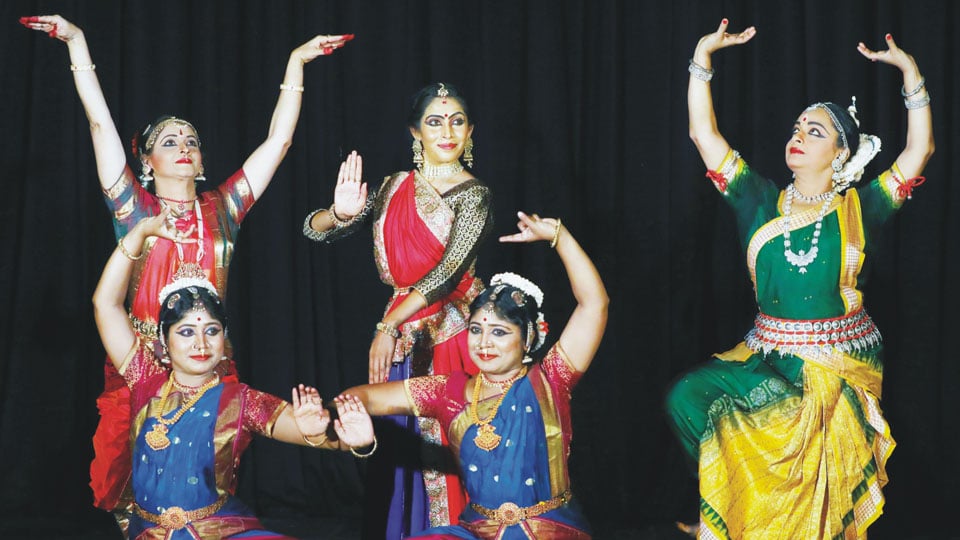The 35th edition of Articulate Festival was celebrated at Veene Seshanna Bhavana, Kuvempunagar, on Sunday, the 21st April, 2019. The festival showcased Bharatanatyam, Kathak and Odissi, making a collage of classical dance arts with colours of one form of south, one from the North and the other from east India. Rasikas were catered with different flavours on a common meal spread.
The concert commenced with kathak by S. Yashaswini, who currently furthering under Guru Mysore B. Nagaraj at Articulate Dance Studios, Bengaluru. She began with a composition that was an ode to Lord Shiva who danced while he played mridanga and accompanied by his consort. In the item “Bajata Mridanga,” one could see the vibrant dancing of the Lord of Dance to the syllables of the mridang. This was a perfect blend of nrutta and nrutya.
Yashaswini in her second act performed two lyrical compositions of Maharaj Bindadin, fused as one thumri and presented in the Lucknow Gharana style. The composition displayed the state of mind of a vipralabhdha nayika and khandita nayika. The chosen thumris were “Avatha Shyama” and “Kaheko Mere Ghar Aaye Ho.” The concluding item of her kathak concert was a Prabandha that described the various components of music and set to dance format by the renowned Kathak exponent Maya Rao.
Yashaswni’s abhinaya shined over her nrutta, when she emoted very effectively the emotions of a nayika while her persona very well suited to the chosen item. Her technique was appreciative in her Shiva dance and in the concluding Prabandha where she exhibited her good training in the thodas and parans.
Next was a duet Bharatanatyam performance by the twins Archana and Chetana, disciples of Guru Devaki Narasimhan, now under Guru B. Bhanumathi, Guru Sheela Chandrashekar of Bharatanjali School of Dance. The twins commenced with a Tamil composition by Arunachala Kavi where the poet wondered as to why Lord Ranganatha is in reclining position. He questioned if he is tired due to His leela’s in his Rama and Krishna avatar? The artistes concluded with a Muthiah Bhagavatar composition eulogising. The ferocious aspect of the demure Goddess in the act of vanquishing evil forces and restoring peace.
Both in “Yen Palli Kondirayya” in the first number and in “Yarrukum Adangada Neeli” the second, the artiste sisters gave an astounding performance. The technicality that was seen in the geometrical movement as demanded by art of Bharatanatyam was wonderfully fused with natya dharmi abhinaya, with satvika involvement. Both items were performed with such sprightly élan that they never gave the spectator time even to blink, lest lose, some fleeting nuance that made their narrative so immersingly interesting.
Radika Makaram, Odissi exponent, currently under the tutelage of Sarita Mishra of Adyasha Foundation, Bengaluru, performed a Nrutta composition “Pallavi” in Raga Saveri and a abhinaya to the lyrics of Sri Jayadeva. Like the blossoming of new leaves and delicate entwine of new creepers of spring, Radika explored the beauty of the movements of Odissi, starting at a slow pace, increasing into a tempo by the end of the song. The Abhinaya she chose to do was for the song “Pashyathi Dishi Dishi” where the sakhi implores Krishna to go to Radha, by describing the plight of a forsaken lover.
Radika Makaram brought out elegantly the nuances of Odissi form ranging from languorous to sculpturesque, boardering on sensual. Sandwiched between mercurial Kathak and vigours of Bharatanatyam, it was a great respite to watch the delicate movements of Odissi as brought out by the artiste. In the Radha’s plight as virahothkantitha nayika and the warm expectations of the beloved’s coming as vasakasajja, Radika unfolded a gamut of emotions skilfully, by submerging herself in the character that surely touched the hearts of spectators.
Dr. Kshitija Barve, a alumni of Nalanda Nritya Kala Mahavidyalaya, Mumbai, presented Bharatanatyam in the final segment of the festival. Dr. Kshitija chose two numbers from her repertoire. The first was Shree Vallabhacharya’s Sanskrit composition “Madhurashtakam” choreographed by Padma Bhushan Dr. Kanak Rele. The second was a signature number “Tillana” in Hindola Raga. A very experienced artiste in the classical genre of Bharatanatyam, Dr. Kshitija went through the routine in a very relaxed, measured and sublime way as against the modern trend of haste. In the Sanskrit shloka delineation, Dr. Barve was very communicative in describing the sweetness of the colourful Lord meandering through the physical and ethereal aspects of Krishna. Even the Tillana rendition echoed the old timers, who performed with such elegance that made concerts an ocean of bliss.








Recent Comments